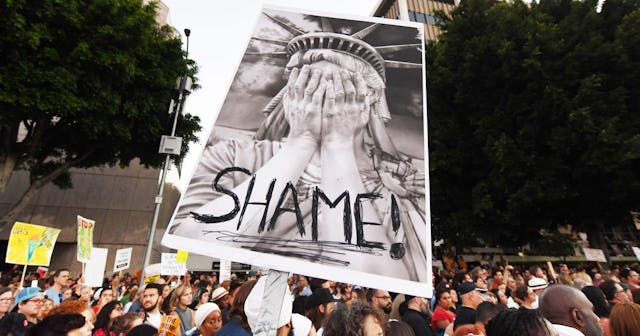Report Finds More Than 100 People Killed After Being Deported Back To El Salvador

A new report sheds light on the disturbing reality many immigrants face when returning to El Salvador, including violence, rape, and death
When we discuss the immigration crisis, most of the narrative is focusing on what is going on inside of our borders. However, what happens to immigrants when they are forced to return to their countries may be the most disturbing part of the story. According to a shocking new report, over 200 people who were sent back to El Salvador from the United States have suffered terribly on their return — many even losing their lives.
According to research conducted by Human Rights Watch, between the years of 2013 to 2019, 138 Salvadorans have been killed and 70 seriously abused — by means of sexual assault, extortion, or torture — after returning to the Central American country.
The goal of the report was to draw attention to the humanitarian crisis going on in the country, and how Trump’s administration has impacted Salvadorans hard.
“This has been a brick-by-brick erection of a legal wall by the Trump administration in an attempt to effectively end asylum in the U.S.,” the report’s co-author, Alison Leal Parker, told NBC News. “Salvadorans are by no means the only nationality, but they are one of the populations that will suffer greatly from this.”
As part of their feature, NBC highlighted a number of these immigrant’s stories. One of those was a mother who fled to the United States with her daughter in 2015 after suffering from physical, sexual and emotional abuse by her partner. She spent her time in the US in a holding cell separated from her 2-year-old. She was deported the following year without her child, because the child’s father, her ex, had reported her for human trafficking. After being forced back into the country, she is living in one of El Salvador’s most violent areas, San Miguel, where eight percent of the country’s homicides occurred in 2018.
“This is a very dangerous place. There’s no safe place here because people get killed all the time,” the woman, who is going by the alias Juana to protect her identity, explained. She added that gang members left her “all beaten” at work in April, adding that it’s been difficult to hold a steady job since criminals are always looking to extort and assault her.
“Being separated from my daughter really affected me,” she added. “That’s not a thing you can just overcome easily.”
The Salvadoran government has determined she isn’t guilty of the accused crime, and after a year and a half, Salvadoran and U.S. officials have reportedly intervened to reunite mother and child.
Then there is the case of “Adriana,” a former Salvadoran policewoman, whose life had been threatened by gangs. She sought asylum in the United States, as she felt her life depended on it. But in 2015 she was deported back to El Salvador. In 2017 she was killed by gang members.
“Gabriel,” a former member of the Salvadoran military, also sought asylum in the US after being targeted by gang members, and was denied. He claims that since his return in 2018 he is constantly receiving death threats.
He is just one of many people who the US has reportedly deported “who flee the country because they have tried to enforce the law,” Parker said. “The consequences for these police officers and law enforcement can be life and death,” Parker she said.
From 2012 to 2017 the number of asylum applications have grown by nearly 1,000 percent — from about 5,600 to over 60,000 — and the U.S. continues to deny so many of them. Only 18.2 percent of Salvadorans seeking asylum from 2014 to 2018 qualified for it, while a whopping 111,000 were sent back to El Salvador.
The report points out that Salvadorans are often denied asylum due to the decision to narrow to two categories — the ability to seek asylum for those fleeing gang and gender-based violence or fleeing because a relative was assaulted or killed. These are the most common reasons Salvadorans reportedly want to leave their country.
The deportation efforts of the United States could result in hundreds of thousands of Salvadorans being forced to leave the country in the next few years, due to the Trump administration’s determination to end many immigration programs.
In their report, the Human Rights Watch details recommended protocol on how both the United States and El Salvador should work to remedy this situation. However, overall, they recommend that “US law be amended to ensure protection from deportation for people who would face serious threats to life or physical integrity if returned to their countries because of a real risk of violence or in exceptional situations, such as natural or human-made disasters, including from the effects of climate change, for which there is no adequate domestic remedy.”